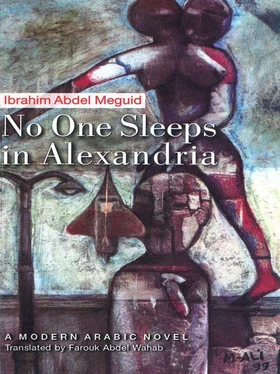He saved the price of clean clothes and a pair of shoes from his occasional jobs. The first thing he did in Asyut was to go to an inexpensive hotel to bathe and sleep after shaving his beard. He slept for a long time, and when he got up he looked at himself in the mirror. What a beautiful face and what anguish were reflected! He started crying for what he had done to himself and for what love had done to him. He thought of going back, his heart having been reassured that she was alive, But he also needed to see her. He walked leisurely in Asyut’s hot streets, then went back and slept. He had decided to go in the morning to the convent, which he had located that day.
On the way he thought of going back and contenting himself with the changes they had both undergone. But he was strong enough to go and see her without suffering a relapse or coming unraveled. He told himself that she too must have become strong. Both were somewhere between the divine and the human: he was a poet; she, a saint.
He saw the great crowd of men and women, sick, bereaved, and afflicted, in love and in life, in soul and in body on the stretch of land between the mountain and the valley, all the way to the village of Drunga. He stood at a distance until shortly before her departure. He was penetrated by the halo around her head and face, by the movement of her little lips that spoke mysterious words that no one heard, by her white habit, by her body that was as fragile as a sparrow’s. Then he approached. The moment that had seemed as distant as Judgment Day finally came. She raised her face to him. The small silver cross shook in her delicate hand. Her lips quivered without words. His smell filled her nostrils and she could scarcely stand, and when he was directly in front of her she almost collapsed, but she collected herself and let the tears flow down her cheeks in front of him, to the amazement of the assembled sick, bereaved, and afflicted. ‘Rushdi’ was the word that he had longed to hear.
“I am cured,” he said.
“I knew it. I saw you walking through the fields. I am also cured,” she said.
“I will go to France after the war. God has given me the gift of poetry,” he said.
“And I will not leave the convent. God has given me the gift of helping others. Love is the Lord’s path, Rushdi.”
They both fell silent. His tears also flowed.
“Will you bless me?”
She nodded and he knelt. She placed her hand on his head and murmured an incantation, then took his hand to raise him to his feet, and in front of everyone she stood on tiptoe and kissed him on the forehead and said, “Good-bye, my love.”
He made his way back through the crowd, and she went back to the convent and did not finish her blessings that day. She stayed inside for three days, during which time the people slept outside the convent until she came out again, preceded by the light of her face.
His Holiness, Thrice-Blessed Abba Yuannis, patriarch of the Orthodox Copts and pope of St. Mark’s mission, had died in Alexandria, and the Most Venerable Abba Usab, archbishop of Girga, was elected to succeed him by the Public Church Council. Saint Mark’s Cathedral opened its doors for the people to view the body of the departed patriarch before he was buried. Dimyan went and came out in a daze — why do people die? It was the first time that he asked himself that question. He was afraid that the all-powerful faith, which had possessed his heart in the previous months, had dissipated in the desert and was no longer enough. But he did not stop asking himself. At night, as he slept in the church courtyard on a mat among his family and other poor families, he once again had a vision of Mari Girgis on his horse, surrounded by fire on all sides, unable to extricate himself from it.
The famous new American Grant and Sherman tanks were now arriving at the Suez harbor and pouring into Alexandria and then to the desert as the British forces were retreating before Rommel to the Egyptian border, then Sallum and Sidi Barraní. The Eighth Army stopped at Marsa Matruh, waiting for the battle. It did not have to wait long. The Axis forces pursued the army, and it withdrew from Marsa Matruh, which was taken by Rommel as the Allies continued to retreat. At Daba there were battles with cold steel in which the soldiers from New Zealand acquitted themselves brilliantly, showing great courage. But who could stop the legendary Rommel, whose very name inspired fear in the hearts of his enemies and was enough by itself to win the war? al-Alamein was the spot where retreating and advancing armies had to stop. It was a bottleneck not more than twenty-five miles wide from the sea to the Qattara depression. It was far from the bases of the Axis forces in Libya. Rommel needed to rest there for some time. For the Allies, it was the best defense area since it was close to their supply lines and because it was too narrow for the kind of military operation that Rommel was so good at. Here he would have to attack directly. There was no room for maneuver.

Rommel! Rommel! Rommel! The name was carried by the wind and repeated by the people associating it with power, cunning, genius, and miracles. Rommel could not be defeated, could not be killed. The armored vehicle in which he was riding exploded as soon as he left it. Shells poured on the trench that his soldiers had left only a short while earlier. An English commando force landed on the Libyan coast from its submarine and reached his headquarters, but he was not there; he was attending a friend’s wedding. The commandos were taken prisoner after a battle during which some of them were killed. His car stalled in the desert so he, accompanied by his staff, accidentally entered a British camp that had a field hospital. He ordered the commander of the hospital and the doctors to stand in front of him and behaved as if he had occupied the place. He asked them if there was anything he could get for them after getting the land he had occupied under control and promised to comply with their requests. After he left, they realized that they had been tricked and that the prize catch had gotten away.
Panic increased in the country and large numbers of Jews left, and their property was sold at ridiculously low prices. The Alexandrians heard the racket of guns at al-Alamein, and confusion reigned in the city. The foreign consulates began to burn their documents, as did the embassies in Cairo. The British embassy thought of evacuating five hundred ATS women to Luxor on the grounds that such a delightful bounty should not be left for the Germans. There was a strong rumor that the English had asked the Egyptian government to flood the Delta in case the Germans occupied Alexandria so that the land would turn into a sea of mud in which the German armored vehicles would be stuck. The people’s resentment of the English grew.
For their part, the English insisted that it was necessary to evacuate the popular singers Umm Kulthum and Muhammad Abd al-Wahhab, voluntarily or involuntarily, from Cairo so German propaganda could not exploit their songs.
People mobbed the banks to withdraw their money. They were gripped with fear and stayed at home, venturing out only when necessary and in groups because of news of the arrival of stray animals — Hons, tigers, wolves, foxes, and monkeys — from the desert, driven into the city by the war. And indeed people found that several monkeys had climbed some trees, so they chased them with stones and killed them. At night dogs turned into foxes and wolves that everyone fled from. As for the lions and tigers, no one saw them. There was news, however, of an old Hon that appeared in the Mina al-Basal neighborhood, went to sleep on the streetcar tracks, and was killed by the first morning streetcar, which almost overturned. Thus people began to expect to see Hons and tigers at any moment. The military commander of Alexandria, an Egyptian, fell into confusion since he had no specific instructions about what he should do in case the Germans entered the city. So he sent a letter to the war ministry asking what he should do if such an eventuality came to pass: should he resist or surrender? The letter was brought to the attention of the minister, who ordered that no response be sent. But the confused commander sent another letter to the same effect, whereupon the war minister yelled, “Transfer the son of a bitch!” The minister was afraid that if he ordered resistance, the Germans would try him if they were victorious, and if he ordered surrender the British would try him for treason! An air raid on the city leveled the whole of Manasha Street in one night. The inhabitants of Karmuz, Raghib, and Ghayt al-Aynab ran in panic to the banks of the Mahmudiya canal, but the German planes dropped many bombs on Mahmudiya that night, setting many ships on fire, sinking them and killing dozens of people on the banks. A great exodus to the countryside began by train, car, taxi, carts drawn by horses and donkeys, carriage, bicycle, and on foot, choking the main road out of Alexandria. The women went out in panic in their housedresses or nightgowns. Dimyan made the rounds to see the damage, as he did after every raid. He found that many houses had been destroyed and among them was Khawaga Dimitri’s house. The second floor had fallen in on top of the first, and the facade wall had collapsed, blocking access to the pavement in front of the locked door, which remained standing. There had been no one at home at the time of the raid, no tenants, and Dimitri had gone to Upper Egypt. Dimyan thought of taking his family there, but he remembered that he had been out of contact with his sisters for quite a long time. So he decided to take his family to the shelters set up by the government in Kafr al-Dawwar.
Читать дальше













